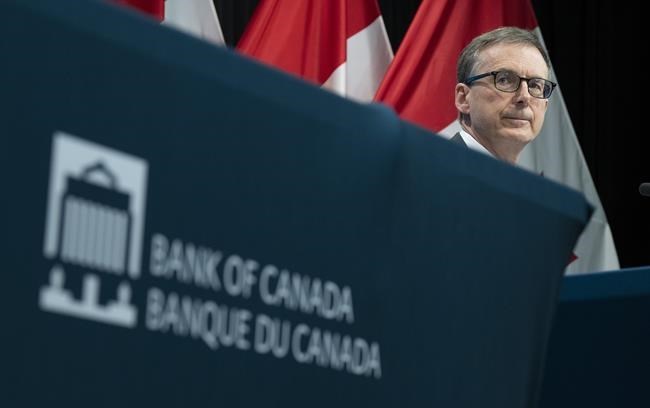TORONTO ŌĆö On a day when the Federal Reserve spooked markets with its tough talk on interest rates, Bank of Canada governor Tiff Macklem says he wonŌĆÖt "rule anything out" when it comes to the central bankŌĆÖs own interest rate path and taming CanadaŌĆÖs out-of-control inflation.
Macklem spoke to reporters virtually Thursday from Washington, D.C. where he is attending meetings of the International Monetary Fund and World Bank Group, as well as meetings of G7 and G20 central bank governors and finance ministers.
He wouldn't rule out pushing rates beyond 50 basis points all in one sitting, after moving to lift rates by that amount to one per cent just last week, but said he "is prepared to be as forceful as needed."
Earlier Thursday, Federal Reserve chairman Jerome Powell said that a 50 basis point interest rate hike is possible in May after one Fed member had suggested a 75 basis point jump can't be ruled out as inflation is now up to 8.5 per cent.┬Ā
The S&P 500 index dropped 1.5 per cent by the end of the North American trading day, while the Dow Jones industrial average closed the day down just over 1 per cent on Powell's comments. Meanwhile, the tech-heavy NASDAQ fell around 2 per cent.
Craig Jerusalim, portfolio manager at CIBC Asset Management, doesnŌĆÖt see the Bank of Canada going above 50 basis points all at once.
"They already moved ahead of the U.S., so I think the 50 (basis-point) pace is probably more appropriate and measured," he said.
Andrew Kelvin, strategist at TD Securities, said in an interview that he believes the central bank could lift rates by more than 50 basis points if "there is little to no slack left in the economy."
"However, with longer-run inflation expectations well anchored, I think the easier path would be for the Bank of Canada to keep lifting rates in 50 basis point increments," he said.
During the roundtable with reporters,Macklem also said it will take longer for inflation to recede due to the pervasiveness of supply chain disruptions, the war in Ukraine and the spike in COVID-19 cases in China.
CanadaŌĆÖs inflation rate soared above expectations to a three-decade high in March, hitting 6.7 per cent.┬Ā
Derek Holt, head of capital markets economics at Scotiabank, said in a recent note that inflation could pop to over eight per cent when Statistics Canada adds used vehicle prices to the Consumer Price Index in next monthŌĆÖs report.
"When they add used vehicles it will be the final blow to the long false argument that Canada has been managing inflation better than the U.S. and other countries because of a lower official inflation rate," he said.┬Ā
Greater and faster interest rate hikes could put even more pressure on homeowners withvariable-ratemortgages who are just getting used to a recent increase to prime rates.CanadaŌĆÖs big banks were swift to lift their prime rates by 50 basis points to 3.20 per cent after the Bank of Canada hiked interest rates last week.┬Ā
"Canada's homeowners will be under tremendous pressure to make the decision to stay the course or face a much higher mortgage payment by locking in," said Ratesdotca mortgage expert, Gary Bovair, in an interview.
"Either way it will affect them, especially the ones who were right at the cusp of qualifying in the last year or two."┬Ā
Macklem said he understands some homeowners are concerned right now, but explained that the 91įŁ┤┤ economy "needs higher interest rates" and that the central bank will be carefully watching the impact on all 91įŁ┤┤s.
"We're not on autopilot," he said.
This report by The 91įŁ┤┤ Press was first published April 21, 2022.
Adena Ali, The 91įŁ┤┤ Press



